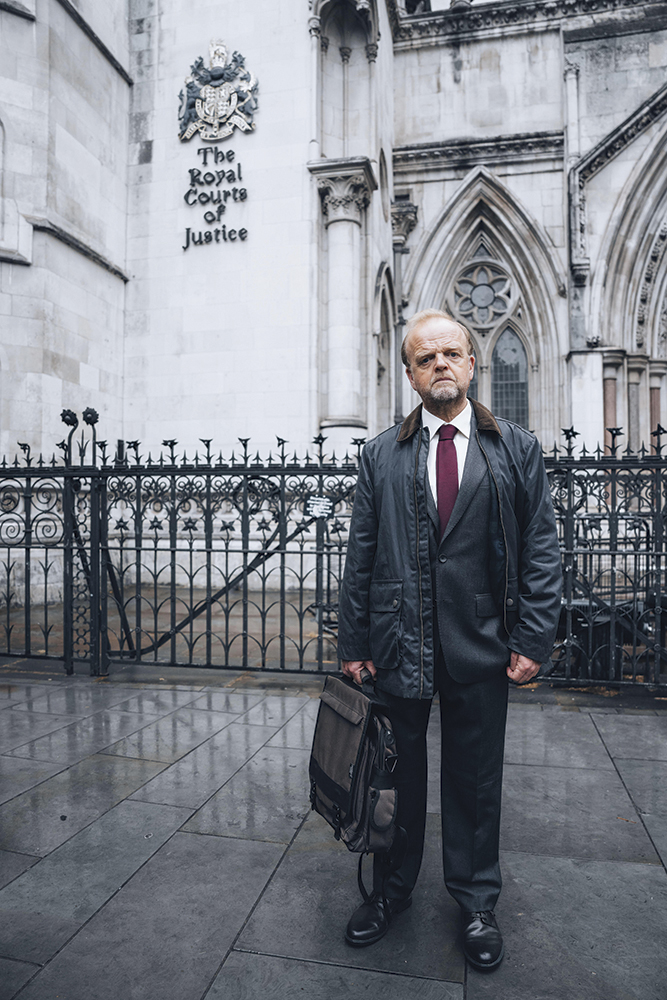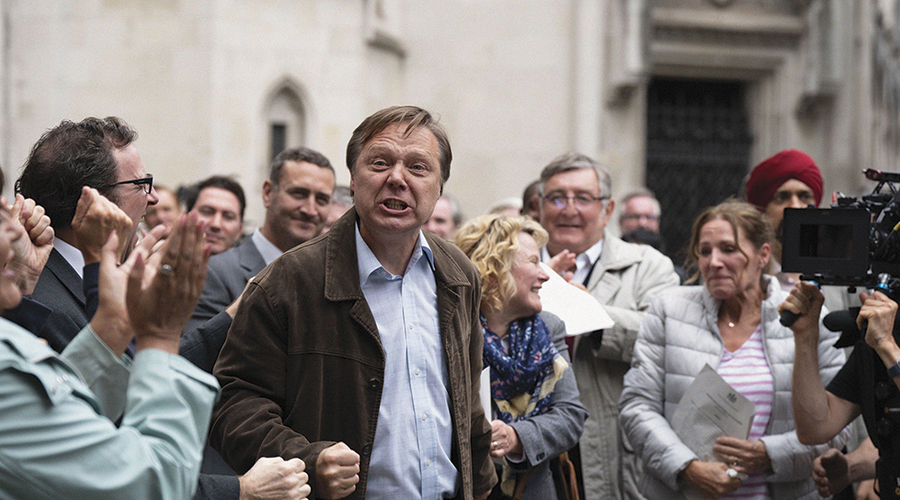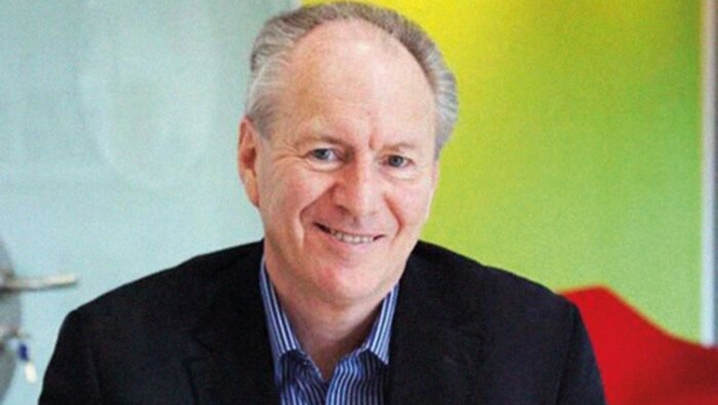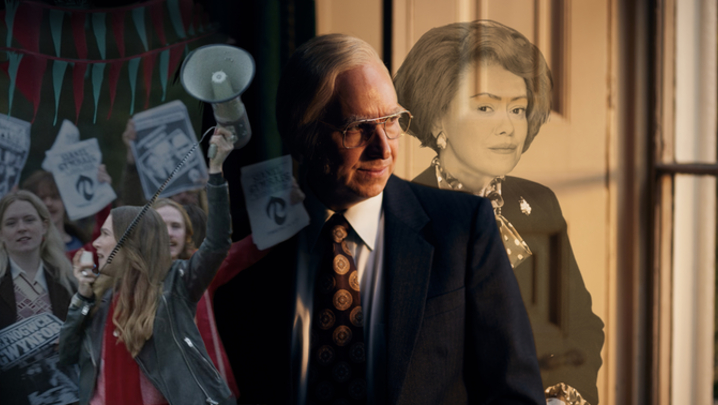ITV’s drama blew the doors off but solid journalism lit the fuse, explains Simon Bucks
Did Mr Bates vs the Post Office have you glued to your TV screen?” asked ITV on social media. The question – presumably rhetorical given the New Year drama’s colossal ratings – was plugging an archive clip of what seems to be the first TV news coverage, in English, of the UK’s biggest miscarriage of justice. “In English” is important.
Tom Savvides was not, until now, a name you will have heard in connection with the Post Office Horizon scandal. In February 2008, Savvides, then a fresh-faced reporter at ITV Meridian South, was dispatched to the Hampshire village of South Warnborough to cover a local news story with a heartwarming twist.
“This postmistress, Jo Hamilton, had been taken to court for fraud by the Post Office, but no one in the village believed she’d committed a crime, and so they helped fundraise for her court case,” recalls Savvides.
“No one we spoke to believed that it was possible for her to defraud the Post Office. They didn’t have a bad word to say about her. The story was this sub-postmistress who got out of her depth and didn’t realise how the computer system worked properly. She wasn’t great at her accounting. That’s why she pleaded guilty to fraud, because that’s what she was advised to do.”
Unsurprisingly, Savvides, like most journalists at the time, was sceptical about Hamilton’s account. “We’re dealing with the Post Office here, which, at the time, had such a good reputation. So, you don’t go down the line of questioning the computer system.
“I remember asking her, ‘Where has £30,000 gone? You’ve been convicted of fraud’,” says Savvides. “She said, ‘I don’t know. I just don’t know where that money is.’ So, as a journalist, you’re dubious. I thought, she must have made a mistake somewhere. Because she’s been to court, she’s been convicted.”

Savvides may have been the first English-language TV reporter on the story, but he was well behind Sion Tecwyn, a Welsh-language news reporter for BBC Wales. He had encountered it two years earlier, when Noel Thomas, an Anglesey sub-postmaster was jailed for nine months for false accounting; the conviction was quashed in 2021.
Tecwyn had known Thomas for many years as a highly respected Plaid Cymru councillor and he was convinced something fishy was going on. “I found it really difficult to believe that Noel would have done something like that,” recalls Tecwyn. “I was shocked when he pleaded guilty, because he’d been adamant that he’d done nothing wrong.”
Like so many sub-postmasters whose lives were ruined, Thomas had been persuaded to admit to false accounting to avoid a conviction for theft. Tecwyn was sceptical: “I was covering the proceeds of crime hearing, where they were trying to reclaim the £48,000 they said Noel had taken. And the Post Office barrister said, very casually, ‘Oh, we haven’t been able to find the money. And I remember thinking Noel isn’t that kind of bloke. If he had stolen money, it would be in his bank account. It wouldn’t be somewhere in the Cayman Islands. That piqued my interest.”
Fast forward to 2009, and Tecwyn was the first broadcast reporter to spot Rebecca Thomson’s groundbreaking Computer Weekly investigation. Noel Thomas – now out of prison – was among the sub-postmasters named, and Tecwyn seized the opportunity to do his own follow-up. “It was a bit of a hard sell to the producers, because they, quite logically, were saying, ‘Well, hang on – he’s pleaded guilty, how come now he’s saying he didn’t do anything?’”
Tecwyn eventually persuaded his bosses to go with the story, but knew it was vital to do a tough interview with Noel Thomas. In an echo of Tom Savvides’s challenge to Jo Hamilton, Tecwyn asked him what he thought had happened to the money. “He said: ‘I think it’s disappeared into the computer system.’”
Tecwyn’s report ran midway down the BBC Welsh-language news, Newyddion, broadcast on S4C, and that might well have been that. Except that his cameraman, Graham Meggitt, was friends with Anna-Marie Robinson, a researcher on Taro Naw, a Welsh-language current-affairs show the BBC made, at the time, also for S4C. “Graham told me he had done a story that he thought might make something for us,” Robinson remembers.
Taro Naw translates as Strike Nine. It’s a play on a Welsh phrase, “strike twelve”, which means, roughly, “makes sense”. Strike Nine suggests things don’t quite add up, and that’s precisely how the postmasters’ story was looking.
Like Tecwyn, Robinson found some colleagues were suspicious and didn’t see it as a story. “I had no doubts, though, I could tell Noel was genuine,” she says. So, too, could her editor, Geraint Lewis Jones, and a producer colleague, Bryn Jones.
Lewis Jones told his team to keep digging. They joined the dots even more extensively than the tenacious Computer Weekly. By the time they were ready to start shooting they had located 36 sub-postmasters in the same predicament as Noel Thomas, including the eponymous Alan Bates in Llandudno and Jo Hamilton 400km away in Hampshire. All had been told by the Post Office that they were alone in having problems with Horizon.
“In the newsroom, they were saying things like, ‘They’ve pleaded guilty, there’s no smoke without fire’,” says Lewis Jones. “But I thought, this is odd: all these people fit a certain profile, exactly the same thing has happened. And the only common thread is this computer.”
Bryn Jones and Robinson had the bright idea of bringing Noel Thomas and Jo Hamilton together on camera, in a scene recreated by writer Gwyneth Hughes in Mr Bates vs the Post Office. “I was there, and it was so emotional, even more than in the drama,” recalls Robinson. “I could feel their relief to meet someone else in the same position.”
“We would actually tell some people for the first time that we’ve spoken to others, maybe even that day, and that would be the first time that they knew they were not alone,” adds Bryn Jones.

The team tried to get the BBC’s national news and current affairs programmes interested. Despite talking to the consumer show Watchdog, nothing materialised. “It was partly the guilty pleas, which straightaway were a barrier,” concedes Bryn Jones. “And when you are talking about IT issues and postmasters, maybe it’s not that exciting.”
Plus, Taro Naw had its own problem: a Welsh-language programme needed most of its interviewees speaking Welsh, and there just weren’t enough to do an immediate follow-up.
It would be another two years before journalist and author Nick Wallis picked up the story. Now universally acclaimed for his passion and drive in highlighting the postmasters’ plight, Wallis is generous in crediting the broadcast journalism which preceded his own.
“The Taro Naw programme was so important, building on the excellent work of the Computer Weekly investigation. Although I’ve never met the producers, Bryn and Anna-Marie, I interviewed them for my book. They conveyed their sense of excitement as they worked on the programme and told me how they began to realise this was such a big story. It remains an excellent piece of television.”
Wallis, then a breakfast presenter on BBC Radio Surrey, found his own regional broadcast champion, the formidable BBC South current affairs boss, Jane French. French helped Wallis produce a powerful radio documentary, broadcast on his own show at 7:00am in February 2011, and on an Inside Out TV report the same evening.
An experienced journalist, French had initially been as sceptical as many others but was quickly persuaded by the sheer numbers of sub-postmasters involved. Nevertheless, getting Wallis’s documentaries on the air involved intense scrutiny, by BBC lawyers and the powerful Editorial Policy Unit.
“Afterwards, the Ed Pol person discouraged me from doing anything more on the story,” recalls French. “He was worried that it would look as if Nick was campaigning and had an axe to grind. Looking back, I wonder if I should have fought back harder. But I worked for the BBC and I did as I was told.”
Yet again, the Horizon scandal story might have stalled if it hadn’t been for Wallis’s determination. The Editorial Policy Unit relented, and Wallis battled on, eventually getting on The One Show and Panorama and doing a Radio 4 podcast series on the scandal. Wallis also credits Private Eye and some newspapers, including the Financial Times, Daily Mirror, Sunday Times and, particularly, the Daily Mail, for keeping the story in the public eye.
Taro Naw and Inside Out are no more – victims of general cuts in long-form journalism. “The story did illustrate the value of having regional current affairs offices around the country, which is sadly no longer the case,” says French. “Our contacts across the nations and regions allowed us to quickly realise that there were multiple victims.”
Stewart Purvis, the media commentator and former ITN Editor-in-Chief, adds: “I’m sure there is a BBC explanation about ratings for scrapping Inside Out. But that sort of regional investigative tool has been lost. I do wonder whether you need something other than a central news gathering hub to do investigations.”
Finally, back in ITV Meridian, Tom Savvides and his colleagues have something to laugh about. “We have a new video editing system and, believe it or not, it’s called Horizon,” he chuckles. “And, yes, it’s not without glitches.”







